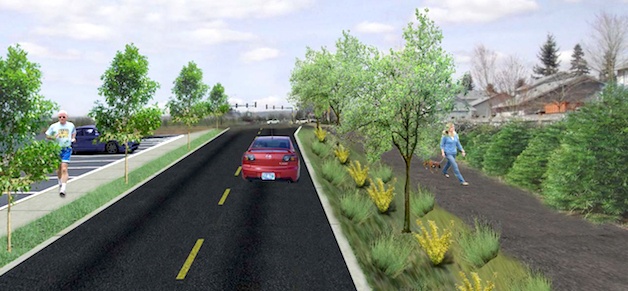ARLINGTON — Of the trio of transportation projects that recently received the green-light for state funding, city public works director Jim Kelly acknowledged that one stands out.
The Transportation Improvement Board’s $79,500 grant to retrofit 120 streetlights along Olympic, 67th and 59th avenues with LED lights is nothing to sneeze at, nor is the $203,000 to apply asphalt overlays on Highland Drive, from Stillaguamish Avenue to Highway 9, and on Cemetery Road, from 67th to 47th avenues.
But the big-ticket item is the nearly $2.4 million to fund construction of the new Arlington Valley Road, which will connect 67th Avenue from the southwest to 74th Avenue from the northeast.
The two-lane industrial road is being designed by Everett-based engineering consultant firm Reid Middleton and is set to include a 12-foot-wide trail, water and sewer utilities, and a low-impact rain garden drainage system.
Kelly explained that city staff advised the City Council of six anticipated areas of growth under the general comprehensive plan, with three of them expected to occur in the near term; central Arlington, the Highway 9 roundabout and the Arlington Airport business park.
The Arlington Valley Road is intended to address these areas, not only by connecting the major arterials of 67th Avenue and 204th Street, but also by providing quick access to Highway 9 and the east side of the former Northwest Hardwoods site.
The Arlington Valley Road project was included in the city’s comp plan more than a decade ago, but the recession delayed its implementation.
Northwest Hardwoods’ 23-acre wood-processing facility closed during the recession, but is being redeveloped into smaller industrial and commercial facilities.
The Arlington Valley Road will provide access to the nearest state route, to deliver raw material to manufacturing plants and finished product to the market. The road is expected to support Arlington’s continued industrial and commercial growth in a currently undeveloped sector of the city that lies within the Arlington/Marysville Manufacturing Industrial Center.
Kelly predicted the project would go out to bid this summer, with construction continuing through the spring of next year.
Kelly anticipates that the LED retrofits should take place this spring, while the pavement preservation is slated for this summer.
“The LED lights require less electricity and last longer, so they ultimately fund themselves through energy savings,” Kelly said.
The city will take advantage of the asphalt overlay on Highland Drive to replace its existing water main.







